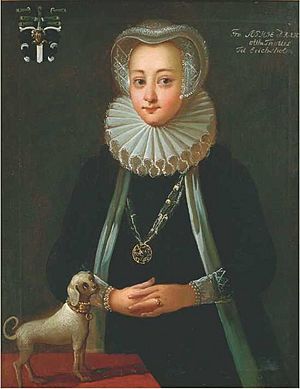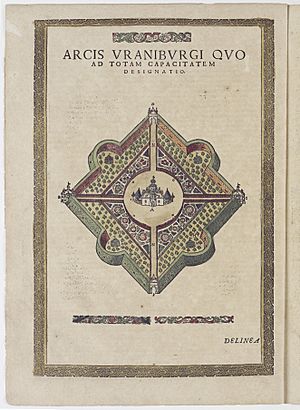Sophia Brahe facts for kids
Quick facts for kids
Sophia Brahe
|
|
|---|---|

Portrait from 1602
|
|
| Born | 24 August 1559 (or 22 September 1556) Knutstorp, Sweden
|
| Died | 1643 (aged 83–84) |
| Known for | Working with her brother Tycho Brahe on making astronomical observations, creating exceptional gardens at Trolleholm Castle, genealogist of Danish noble families |
| Spouse(s) |
|
| Children | Tage Thott |
| Scientific career | |
| Influences | Tycho Brahe |
Sophie Brahe (born August 24, 1559, or September 22, 1556 – died 1643) was a smart and determined Danish noblewoman. She was interested in many subjects, including astronomy, chemistry, medicine, and gardening. Sophie is best known for working with her famous brother, Tycho Brahe, on his astronomy projects. She also created amazing gardens and wrote about the history of noble families.
Contents
Her Early Life and Family
Sophie was born at Knutstorp Castle in what is now Sweden. She was the youngest of ten children. Her father, Otte Brahe, was an important advisor to the King of Denmark. Her mother, Beate Bille Brahe, managed the royal household for the Queen.
Sophie's oldest brother was the famous astronomer Tycho Brahe. Even though he was much older and grew up in a different home, Sophie and Tycho became very close. They shared a love for science. Their family, however, did not think science was a proper activity for noble people.
Marriage and New Interests
In 1579, Sophie married Otto Thott. He was 33 years old, and she was around 20. They had one son, Tage Thott, born in 1580. Otto Thott passed away in 1588.
After her husband's death, Sophie took charge of his large property called Eriksholm, which is now Trolleholm Castle. She managed the estate to make sure it stayed profitable. During this time, she also became very skilled in gardening. Her gardens at Eriksholm were known for being beautiful and special. Sophie also continued her studies in chemistry and medicine. She used her knowledge to help people in the local area.
In 1587, King Frederick II of Denmark gave Sophie Brahe ownership of a farm called Årup.
Love and Challenges
Sophie often visited Uranienborg, her brother Tycho's observatory. There, she met Erik Lange, a nobleman who studied alchemy. Alchemy was an old practice that tried to turn metals into gold. Sophie and Erik became engaged in 1590.
Their marriage was delayed for several years because Erik spent most of his money on alchemy experiments. He had to travel to Germany to avoid people he owed money to. During this time, Tycho Brahe wrote a Latin poem called "Urania Titani." It was written as a letter from Sophie to Erik, showing how much she missed him. In the poem, Tycho called Sophie "Urania," who was the Greek goddess of astronomy. This showed how much he respected her scientific work.
Sophie and Erik finally married in 1602. They lived in poverty for a while. Sophie wrote a letter to her sister, describing how difficult their life was. She was also upset that her family did not support her science studies or give her money she was owed. Erik Lange died in 1613.
Later Life and Contributions
Sophie faced challenges because of her marriage to Erik Lange. Many people did not approve of it, except for her brother Tycho.
Sophie personally paid to fix up the local church, Ivetofta Kyrka. She had planned to be buried there, and her unused tomb lid is still in the church today. By 1616, she moved to Zealand in Denmark and settled in Helsingør. There, she focused on gardening and using plants for healing.
In her later years, Sophie spent her time writing about the family histories of Danish noble families. She published her first big book on this topic in 1626. Her work is still an important source for learning about the early history of Danish noble families. Sophie Brahe died in Helsingør in 1643. She was buried in the Torrlösa old church in Sweden.
Her Work in Science
Tycho Brahe said he taught Sophie about gardening and chemistry. However, he first tried to stop her from studying astronomy. But Sophie learned astronomy on her own. She read German books and even paid to have Latin books translated so she could understand them. Later, Tycho worried that astronomy was too complex for a woman.
Tycho was not worried about Sophie's ability to observe the stars. Instead, he was concerned she might not fully understand astrology, which was connected to astronomy back then. Astronomers were expected to create horoscopes for their clients, and these were taken very seriously.
Sophie often visited Uraniborg, Tycho's observatory on the island of Hveen. She helped him with his observations for his book De nova stella (On the New Star). She helped with observations on November 11, 1572, which led to the discovery of a supernova (a new, very bright star) called SN 1572. She also helped observe a lunar eclipse on December 8, 1573.
The discovery of SN 1572 was very important. It helped show that the geocentric model (the idea that Earth was the center of the universe) was likely wrong. Sophie's help was also key to Tycho's work on how planets move. His studies were the most accurate measurements of planet movements before the telescope was invented. Tycho made many of the tools, and Sophie was one of the assistants who actually took the measurements. Tycho admired Sophie's "determined mind."
After her important contributions in the 1570s, Sophie gained more freedom in her astronomy research. Even though Tycho had doubted her ability with horoscopes, Sophie took over many of Tycho's astrology duties for their clients when he was away between 1588 and 1597.
Tycho asked King Frederick II for money to build more observatories. The king thought they were only for Tycho. However, some observatories were actually built for Sophie to use for her own observations. Much of the data Tycho collected was passed to his student, Johannes Kepler, not to Sophie. But Sophie's work with her brother helped lay the groundwork for later scientists like Isaac Newton.
Sophie was more interested in hands-on observation than experiments. This was clear during her second marriage. Her husband, Erik Lange, was an alchemist trying to turn metals into gold. With Sophie's support, they spent all their money on these experiments. They lived in poverty until Erik Lange passed away. This allowed Sophie to move back to Denmark with her son, who likely helped her financially. She then continued her scientific work and wrote about the history of Danish noble families.
Urania Titani: A Poem for Sophie
"Urania Titani" was a poem written by Sophie's brother, Tycho Brahe. It was about a fictional love story between Sophie and Erik. Tycho wrote the poem in Latin, a language Sophie did not speak fluently.
In the poem, Tycho called Sophie "Urania," the goddess of astronomy in Greek mythology. He called Erik a "Titan," a son of Uranus (mythology). The poem showed Sophie missing her husband while he was away studying alchemy. It also showed how close Sophie and Tycho were and how they shared similar ideas. Tycho used the poem to show off his bond with his sister and his pride in their shared scientific work.
Her Genealogy Work
Sophie is also well known for her work in genealogy, which is the study of family histories. Her first work on this was finished in 1600. Back then, family histories were kept in "family books." These books included details about family members, traditions, and different branches of the family.
In her family books, Sophie included letters and conversations with other women about their shared family backgrounds. She also added interesting stories from her family. Sophie's work was common for women of her time, as women were often valued for their writing skills and for keeping track of household matters.
Her Lasting Impact
Sophie Brahe and her brother Tycho are seen as symbols of the growth of learning and science during the Danish Renaissance. She worked closely with her brother in his scientific projects and is thought to have inspired him. The poet Johan L. Heiberg once said that "Denmark must never forget the noble woman who, in spirit much more than flesh and blood, was Tycho Brahe's sister; the shining star in our Danish heaven is indeed a double one." This shows how important Sophie was.
In 1626, Sophie finished a 900-page book about the family histories of 60 Danish noble families. This important book is now kept at Lund University.
See also
- In Spanish: Sophia Brahe para niños
 | William L. Dawson |
 | W. E. B. Du Bois |
 | Harry Belafonte |


